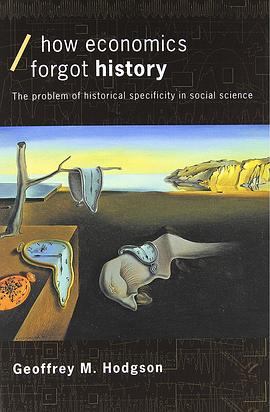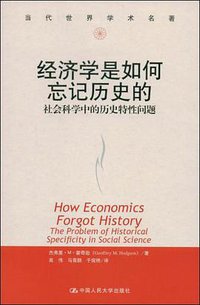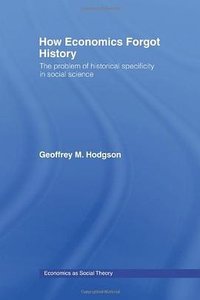How Economics Forgot History
豆瓣
The Problem of Historical Specificity in Social Science
Geoffrey M Hodgson
简介
Economics today has been widely criticised as being more concerned with mathematical technique than the understanding and explanation of real world phenomena. However, one hundred years ago, in Europe and America, economics was fused with the study of history and its practitioners emphasised the importance of the understanding of specific institutions. How Economics Forgot History shows how the German historical school addressed a key problem in social science and concerned themselves with the historical specific character of economic phenomena and the need to make economic theory more sensitive to the historical and geographical variety of different socio-economic systems. Examining the nature and evolution of the problem of historical specificity, it shows how this problem was tackled by the likes of Karl Marx, Gustav Schmoller, Carl Menger, Werner Sombart, Max Weber, Alfred Marshall, John Rogers Commons and Frank Knight. It is also argued that alongside Lionel Robbins, leading figures such as John Maynard Keynes, Joseph Schumpeter and Talcott Parsons also helped to divert the social sciences away from this problem. Geoffrey M. Hodgson concludes with some suggestions as to how modern economics can begin to once again take this problem on board, and become more sensitive to the great structural and institutional changes in history, as well as those we have witnessed in recent decades. He argues that disciplinary boundaries have to be re-evaluated, in an effort to once again provide the social sciences with an adequate historical vision.
contents
Part I Introduction: the limitations of general theory-- the problem of historical specificity.
Part II The nineteenth century: the German historical school and its impact-- Karl Marx and the specificity of the capitalist system-- the older historical school in Germany-- the historical school in the British Isles-- the methodological failure of the older historical school-- out of Austria - Carl Menger and the methodenstreit-- Alfred Marshall and the British methodendiskurs-- the responses of the younger historical school in Germany.
Part III The twentieth century: from American institutionalism to the end of history-- Thorstein Veblen and the foundations of institutionalism-- early American institutionalism and the problem of historical specificity-- the theoretical manifesto of John Commons-- Talcott Parsons and the ascent of ahistorical sociology-- death and counter-revolution at the London School of Economics-- John Maynard Keynes and his declaration of a general theory-- the triumph of barren universality-- institution blindness and the end of history.
Part IV The millennium: the second coming of history? are there universals in social and economic theory-- property, culture, habits and institutions-- exchange and production - property and firms-- a note on social formations and levels of abstraction-- an evolutionary perspective on the historical problem-- invention is helpless without tradition.

